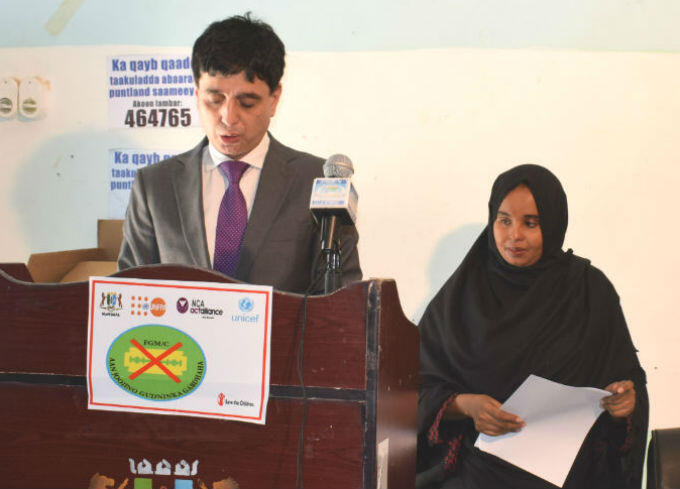Bismillohi Rahmonirrahim
Assalamu Alaikum/Ladies and Gentlemen
It is my honor to join you today and also a pleasure for me to address this commemoration event on the International Day of Zero Tolerance for Female Genital Mutilation.
We truly appreciate the government leadership in creating an enabling environment for the Joint UNFPA/UNICEF Female Genital Mutilation Abandonment program, and the commitment of key national stakeholders to advancing the Sustainable Development Goal’s target of eliminating all harmful practices by 2030,
Female genital mutilation is still a widespread and deeply entrenched social convention. According to the most recent survey, 77% have had female genital mutilation and of the women with daughters, 34% have had their daughter undergo the harmful procedure.
Female genital mutilation is known to be harmful to girls and women in many ways. First and foremost, it is painful and traumatic, causing several immediate and long-term health consequences, including physiological dysfunction, organ damage and disability, chronic pain, loss of bladder control (11.7 percent), fibrous scar (9.7 percent), recurrent infections, fatal bleeding, difficult childbirths (33 percent) and fistula (4.3 percent).
We acknowledge that most of the barriers to the realization of women’s and girls’ dignity and rights emerge from the harmful practices, including female genital mutilation. The harmful practice violates the rights to health, security and physical integrity of the person, the right to be free from inhuman or degrading treatment, and the right to life when the procedure results in death.
When girls are not at high risk of illness and death related to female genital mutilation; when girls’ dignity is advanced and their rights to health, physical integrity and security are protected by eliminating the harmful practice - they become assets for the country’s socio-economic development. The country can only attain sustainable development if the unique role of women and girls is appreciated and promoted.
Over the past four years, we have witnessed positive developments and successful endeavors on the way to ending female genital mutilation within a generation:
The President of Puntland State of Somalia, H.E. Abdiwali Mohamed Ali enacted a decree outlawing all types of female genital mutilation on the 8th of March 2014, followed by a comprehensive policy framework developed by the Ministry of Women Development and Family Affairs and endorsed in November of the same year.
Our advocacy, sensitization and policy endeavors are augmented by community-based and community-led interventions that led to many communities publicly announcing complete abandonment of all forms of female genital mutilation.
The “medicalization” of female genital mutilation, wherein the procedure is performed by health providers, constituted an alarming trend. But thanks to the timely and coordinated efforts of the Ministry of Health and UNFPA/UNICEF, strategies against medicalization of female genital mutilation have been formulated.
The zero tolerance FGM Policy in Puntland provides a huge opportunity for us to end female genital mutilation within a generation. Engaging one of the most influential groups in Puntland – the Somali Sheiks and Imams – has not only led to public anti-female genital mutilation declarations by religious leaders but the signing of a ‘Fatwa’ or religious ruling against all types of female genital mutilation. The ‘Fatwa’ declaration states that Islam denounces all forms of harmful practices on the human body, as Qur’an emphasizes that human beings are created in the best shape and structure: “We have certainly created man in the best of stature” Chapter 95, verse 6.
¡ قال تعالى ( لقدخلقنا الإنسان في أحسن تقويم) في سورة التين الأية(٤)
The recently established Religious Leadership Network Against Female Genital Mutilation provides encouragement for an effective awareness raising platform and delinking the harmful practice from Islam.
As noted in the joint statement by UNFPA Executive Director, Dr. Babatunde Osotimehin, and UNICEF Executive Director, Anthony Lake – “Let us make this the generation that abolishes FGM once and for all – and in doing so, helps create a healthier, better world for all. “ The joint statement has been shared with our key stakeholder and media contacts.
On this note, I would like to reiterate my sincere gratitude and appreciation to Puntland government and other key stakeholder for their commitment and untiring efforts aimed at alleviating the sufferings of Somali women and children.
Thank You/Mahadsanidin
------------------------------------------------------------------------------------------------------------------------------------------
For more information please contact UNFPA Somalia Communications Specialist Pilirani Semu-Banda on e-mail: semu-banda@unfpa.org
- See more at: https://somalia.unfpa.org/news/moving-carmma-next-level-focusing-young-…
------------------------------------------------------------------------------------------------------------
For more information please contact UNFPA Somalia Communications Specialist Pilirani Semu-Banda on e-mail: semu-banda@unfpa.org


